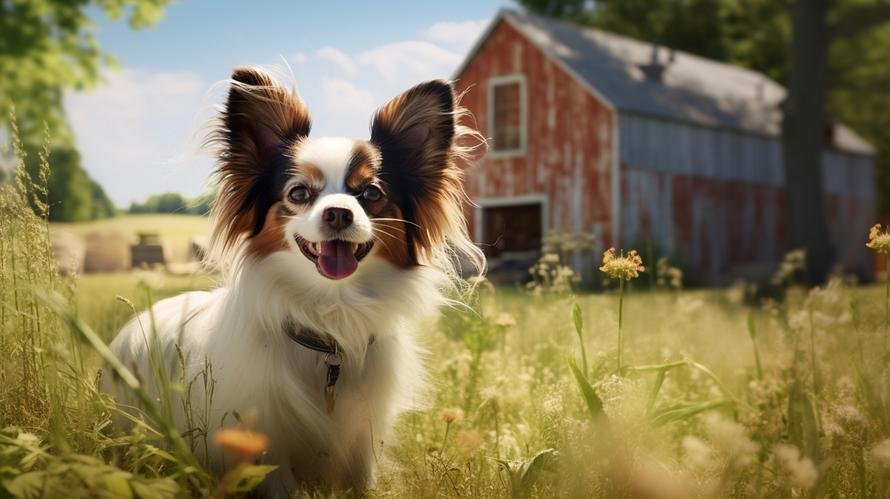Did you know that the renowned Papillon dog breed’s name was coined from ‘Papillon’ – the French word for butterfly? This moniker bears quite a vivid reference to the breed’s famed, large, upright ears which indeed resemble a butterfly’s open wings. More than just their captivating appearance, this breed holds an enigmatic historical appeal. In the 17th century, these dogs were the companions of European aristocracy. Notable individuals like the French queen, Marie Antoinette, are often depicted in art with Papillons hinting at the high esteem these furry companions were held.
Now that you have an idea of our subject matter, a pertinent question arises: Does a breed with such a grand history need special dog food? If so, what kind? These inquiries are fundamental for every Papillon parent that cares for their pet’s health and well-being. The short answer to these queries is yes, your Papillon does need specific dietary conditions. However, as we all know, the devil is always in the details. Let’s dig into these details and unveil the mystical world of a Papillon’s diet!
Before diving into the specifics and intricacies of a Papillon’s diet, it’s important to understand this breed’s idiosyncratic qualities. Papillons are typically small to medium-sized dogs with an average weight of 5-10 pounds. Despite their small stature, they are usually quite active and require a balanced diet enriched with the right nutritional elements to fuel their energy. Also, like all dogs, the age, metabolism, and activity level of your Papillon will significantly influence the type and quantity of food they require.
A Papillon’s diet should be rich in protein. Why? Their bodies, like those of other dog breeds, are programmed to convert protein into energy effectively. High-quality dog food, comprising real meat such as chicken, beef, lamb, or fish usually suffices. Remember, the amino acids essential for dogs are largely found in animal-based protein sources.
Additionally, your Papillon needs dietary fat. Before raising your eyebrows in astonishment, it’s worth noting that fat is a primary energy source for dogs. It aids in the absorption of vitamins and promotes a healthy skin and coat. Look out for dog foods that contain Omega 3 and 6 Fatty Acids, as they help fight inflammation and keep your Papillon’s heart health in check.
Don’t miss out on including a moderate amount of carbohydrates, too. However, avoid dog foods that use cheap fillers or unnecessary grains as they provide less nutritional value. Instead, opt for complex carbs like sweet potatoes and brown rice which are digestible and foster slow energy release.
Remember good health doesn’t just stop at your Papillon’s physical well-being. Cognitive health is just as important. Certain dog foods add DHA, a form of Omega-3 which aids in cognitive development, especially for puppies. Antioxidants such as Vitamins A and E, often listed as tocopherols in dog foods, fortify your dog’s immune system and play a pivotal role in maintaining their vision and heart.
In your quest for the perfect dog food, don’t forget to evaluate the ‘Feeding Guide’ found on most pet food labels. It details the recommended portions based on size and weight. Just be cautious because most portions are designed with less active breeds in mind. Being a generally active breed, your Papillon may need slightly more than the advised portion on the packaging.
Feeding your Papillon more than the average amount can be a bit scary given the risk of obesity in dogs. However, you can mitigate this risk by ensuring your Papillon gets regular physical exercise. Whether it’s a walk in the park or a game of fetch, keeping them active helps maintain a balanced weight.
Furthermore, avoid offering table scraps and restrict treats for training purposes. Over-dependence on such foods can hamper your pet’s nutrition in the long run. Remember, an appropriate diet is one that meets their nutritional needs while making each mealtime exciting.
Knowing when and how often to feed your Papillon is equally as relevant as knowing what to feed them. Puppies typically require three to four meals a day, while adult Papillons can be fed twice a day. The split feeding helps maintain blood sugar levels and provides a steady flow of energy.
It’s equally paramount to always provide clean water for your Papillon. Water helps with digestion and absorption of nutrients. It also assists with the regulation of their body temperature and lubricates their joints, which is crucial for these active creatures.
In conclusion, while your Papillon does not necessarily need a breed-specific dog food, their diet needs to be specifically tailored to their size, activity level, and nutritional needs. By ensuring your Papillon enjoys a balanced diet, you gift them with vitality and longevity for many butterfly years. It’s not just about keeping them alive but about enhancing their quality of life, letting those butterfly ears of joy flutter for as long as possible!
Additionally, remember that every dog is unique. What works best for one might not necessarily work for another. A diet that your Papillon friend might relish and find highly beneficial could potentially be less optimal for your Papillon. Always remain open to tweaking your pet’s diet based on their individual health and lifestyle needs. When in doubt, always consult with a pet nutritionist or a vet. After all, we all want our Papillons to be healthy, active, and ready to spread their wings!



